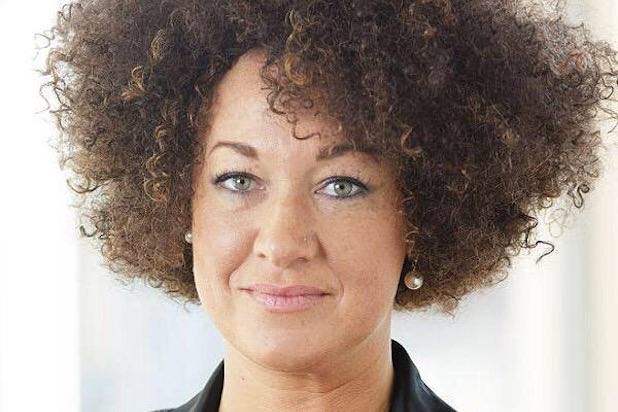Rachel Dolezal is an unwitting black, Tervor Phillips is white and everyone is a victim of racism

Rachel Dolezal is the white woman who pretended to be black. Dolezal, 37, has quit her role in the National Association for the Advancement of Colored People (NAACP).
She said her dad is black. He isn’t. At least he thinks he isn’t. He says his spray-tanned, Afro-wigged daughter needs help.
The New York Times says “Faking a racial history, in either direction, raises difficult questions about what race is and why it matters,”
Dolezal’s a liar. She deceived people. She told people her parents in South Africa whipped her with a device “pretty similar to what was used as whips during slavery”. Her parents live in Montana. They’ve never been to South Africa. She lists the alleged hate crimes she has been subjected to as if stamping rites of passage and authenticity on her bones.
Rachel Dolezal has survived many ordeals. She is a victim. She is a martyr. She thought that to really get ahead you need to be disadvantaged.
Rachel Dolezal is a liar. She wanted her ‘white guilt’ assuaged by her adopted group. And – maybe – that’s the one decent lesson from all this: only looking at a person’s racial identity makes fools of us all.
But above all else Dolezal is a liar. Dolezal once used her university for discriminating against her because she was white:
Dolezal, who at the time was known as Rachel Moore, claimed that the removal of her artwork from a student exhibition in 2001 “was motivated by a discriminatory purpose to favor African-American students” over her.
But here’s Trevor Phillips in the Times:
Who is black and who is white — and do we need these racial categories at all?
Trevor Phillips might not be real. But he is. He’s not been invented.
Are they helpful in the battle against discrimination or are they just preserving outdated social divisions? And who is really guilty of hypocrisy here — a wannabe Angela Davis with a fake tan or her critics?
He adds that Dolezal is the unwitting black woman:
The likelihood is that Dolezal probably does unwittingly have some African heritage, as do most Americans and many Brits. In late Georgian times, London was home to 20,000 runaway African slaves. Within two generations, the dark skins had disappeared as these men and women intermarried to the extent that their descendants probably have no idea of their own heritage. It’s now possible to identify families who had always thought of themselves as white but who carry the gene for sickle cell anaemia — a condition peculiar to those of West African heritage.
He then says black is not how others see you but how you see yourself.
The fact is that the race relations story can no longer be written in black and white. Rachel Dolezal should be a middle class, middle America kind of gal. That is, until you note that she grew up with four adopted African-American siblings. She took her undergraduate degree at the most prestigious of the historically black colleges, Howard University. She married (and divorced) an African-American. And she refers to herself, not as an African-American woman — but as a “political” category, “black”.
Does Dolezal’s background make her so much less politically “black” than the Cleveland-born beauty queen and actress Halle Berry, child of a Caucasian mother, who has not, she says, seen her African American father since she was four years old?
Dolezal is a liar, Trevor. She is not black.
We’ve got ourselves in a terrible mess over race, and we really can’t call the lady crazy for following the rules we’ve made up. It’s not Rachel that’s a bit mad. It’s us, and until we have an honest conversation about race, she really ought to be able to call herself whatever she wants.
Madness.
What’s key is that you can’t choose your position in the hierarchy. The political designation of race is a function of power—or, put differently, you are whatever the dominant group says you are. A Nigerian immigrant might not identify with black Americans, but she’s still “black,” regardless of what she says, and if she gets pulled over by the police, that identity will matter most. And on the other end, a black American with dark skin and African features could identify as white with her friends, but in society, she’s black, regardless of how she feels. . . .
To belong to the black community is to inherit a rich and important culture; to be racially black is to face discrimination and violence.
. . .
We don’t know the entirety of [Rachel] Dolezal’s story, and we will likely learn more. If it’s troubling, it’s at least partly because it feels like Dolezal is adopting the culture without carrying the burdens. And with the fake father and the fake children, it seems like she’s deceiving people for the sake of an à la carte blackness, in which you take the best parts, and leave the pain aside.
Elizabeth Price Foley counters:
Got it. Black = impuissance and being permanently subjected to violence/discrimination. If this disappears, one’s blackness disappears. This explains why prominent, conservative blacks such as Clarence Thomas, Ben Carson, Tim Scott, Condoleezza Rice, Thomas Sowell and Allen West are so often labeled “Oreos” or “Uncle Toms” by prominent, liberal/progressive blacks. If a black person doesn’t constantly wallow around in his/her “blackness,” he/she isn’t genuinely “black.”
SNBC’s Melissa Harris-Perry mused on the TV: “Is it possible that she might actually be black?”
In a word: no.
Maybe she just wanted to say the N-word. Language is NSFW:
Posted: 16th, June 2015 | In: Reviews 0 Comments | TrackBack | Permalink


